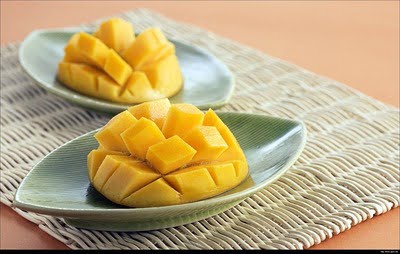It’s hard to resist mango, but can your Persian cats eat mango too?
This exotic fruit often seduces us with its delicious aroma and sweet taste.
But what if you’re not the only one waiting to eat a bowl of mango cubes? Have you ever noticed that your Persian companion is sitting next to you, hoping for the same treats?
Some Persian cats are interested in anything they see their owner nibbling on, and many Persian cats are also curious about new things, so mango pieces can pique your cat’s interest.
Before you share your fruit treat with your furry companion, however, find out if Persian cats can eat mangoes.
Can Persian cats eat mangoes?
Mango flesh is generally safe for Persian cats. Although mangoes are not toxic to cats, we recommend that you only give your cat a small piece occasionally.
This is because, as with many other fruits, the high sugar content of mangoes is a big reason why people find them so tasty.
In addition, mangoes offer little nutritional value to Persian cats, so it’s best for owners to use food made specifically for cats as an alternative to human food. If you decide to feed your Persian cat human food, always talk to your veterinarian first.

Is mango good for Persian cats?
Persian cats are obligate carnivores and get all the nutrients they need from high-quality cat food containing animal protein.
Although mangoes are rich in nutrients that are also good for humans, Persian cats do not need them in addition to their complete and balanced diet.
The vitamin C contained in this tropical fruit greatly benefits us, humans. but Persian cats can produce it themselves.
Persian cats can also get sufficient fiber from their complete and balanced diet.
So the amount contained in a few pieces of mango makes little difference to your cats.
In addition, too much fiber can cause digestive problems. However, the fiber content of an occasional small piece of mango is generally not harmful to Persian cats.
Mangoes also have high sugar content. While a limited amount of mango pulp is acceptable for most pets, it can be a problem for overweight Persian cats or those with underlying conditions such as feline diabetes.
For these felines, it is best to avoid mangoes altogether.
How to offer a mango to your Persian cat?
If you and your veterinarian decide that your furry Persian should enjoy a cube of mango as a treat, don’t overdo it.
A small cube is usually enough to satisfy your feline’s curiosity.
Here are other tips to keep in mind when giving your Persian cat mango:
- Do not allow your Persian cat to eat the peel
- Remove the seeds
- Cut the mango into small cubes that can be easily digested by the kitty.
- Use fresh mango and prevent fruit in syrup or dried mango, since these products have very high sugar content.
Symptoms to watch out for when feeding mango to your Persian cat
Your vet has given the go-ahead, you have peeled the fruit, removed the seeds, and cut it into pieces.
Now it’s time to see what your Persian cat thinks of it. It is always a good idea to keep an eye on your furry friend after feeding him something new.
Symptoms such as vomiting or persistent diarrhea should prompt a visit to your vet.
Also watch for signs of choking so that you can intervene immediately if necessary, and be sure to feed the cat only a small cube of mango at a time.
Also note that mango can have a rather sour taste, which is why many pets don’t like it! If your Persian cat is not interested, it is a good idea to try another treat.
Now that you know that Persian cats can eat mango, you should also look for other fruits that your cat might be interested in. Find out if Persian cats can eat watermelon and if you can safely give your kitties bananas.
Conclusion:
Mangoes are safe for Persian cats as long as you limit the portions so the pet doesn’t eat too much sugar.
We’ve found that many Persian cats like the taste, and it can be a good way to get an obstinate Persian cat to eat it.
The downside is that it contains a lot of sugar and can upset the cat’s delicate digestive system, which should only eat animal protein.


